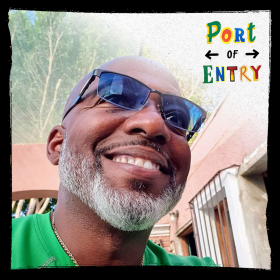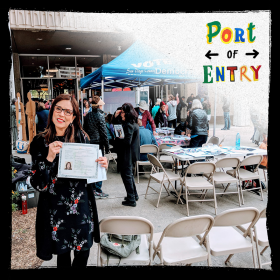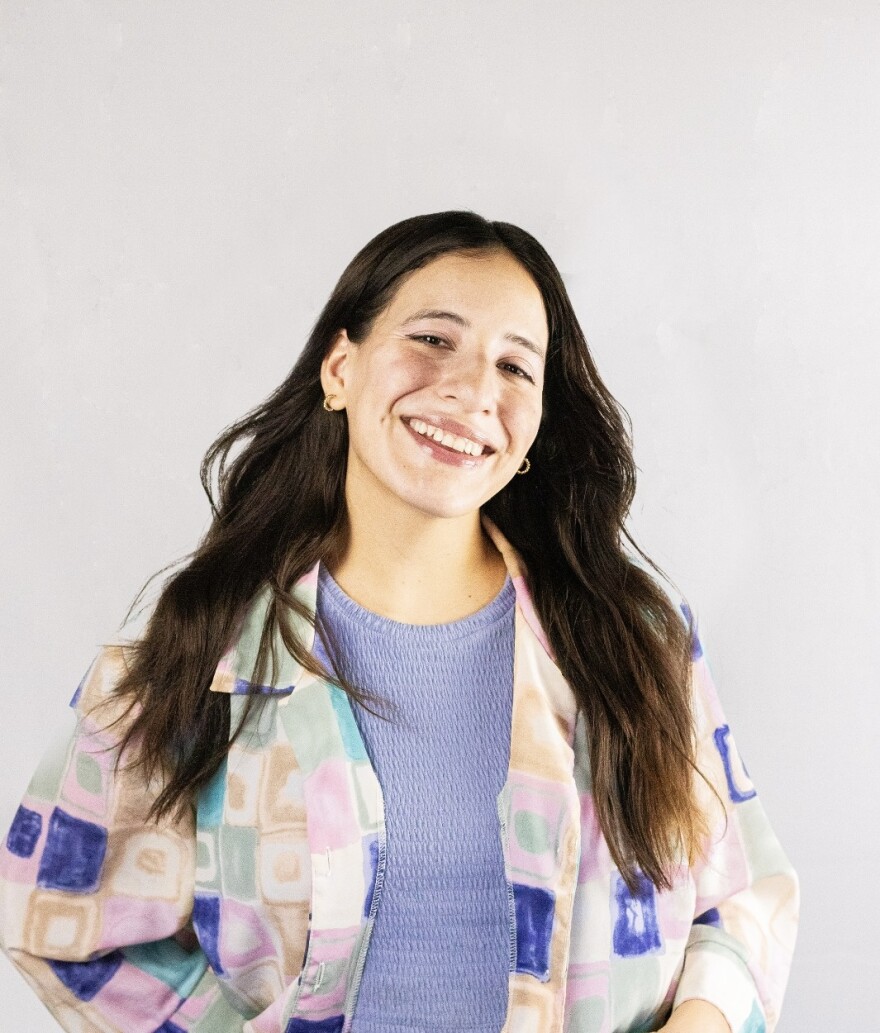Port of Entry
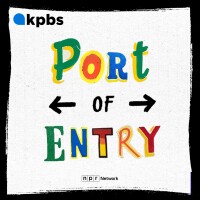
These are cross-border stories that connect us. Border people often inhabit this in-between place. From KPBS and California Humanities, “Port of Entry” tells personal stories from this place — stories of love, hope, struggle, and survival from border crossers, fronterizxs, and other people whose lives are shaped around the wall. Rooted in San Diego and Tijuana, we are a transborder podcast for transborder people. We live life on la linea.
Have you checked out our podcast in Spanish? If so, Take our survey.
¿Hás escuchado nuestro podcast en Español? Participa en nuestra encuesta.
Ways To Subscribe
-
Our series on cross-border love stories continues. Today, two families separated by deportation share stories about how their love keeps them connected despite the border wall between them. Episode art by @Deportedartist: https://www.instagram.com/deportedartist Follow “Port of Entry” online at www.portofentrypod.org, or on Facebook (www.facebook.com/portofentrypodcast) or Instagram (www.instagram.com/portofentrypod). Support our work at www.kpbs.org/donate. Search “Port of Entry” in the gifts section to get our sling bag as a thank-you gift. If your business or nonprofit wants to sponsor our show, email podcasts@kpbs.org. Text or call the "Port of Entry" team at 619-452-0228 anytime with questions or comments about the show
-
Today on “Port of Entry,” we continue our series of cross-border love stories with a former Tijuana booster who grapples with his relationship with the city as it continues to suffer from record-breaking violence and other problems he can no longer ignore. *There is explicit language in this episode. Connect with Tony: https://www.instagram.com/corazondetortasd/ Follow “Port of Entry” online at www.portofentrypod.org, or on Facebook (www.facebook.com/portofentrypodcast) or Instagram (www.instagram.com/portofentrypod). Support our work at www.kpbs.org/donate. Search “Port of Entry” in the gifts section to get our sling bag as a thank-you gift. If your business or nonprofit wants to sponsor our show, email podcasts@kpbs.org. Text or call the "Port of Entry" team at 619-452-0228 anytime with questions or comments about the show.
-
Today on “Port of Entry,” we launch a series of cross-border love stories. First up: How smart-phone applications are playing matchmaker for people on opposite sides of the U.S.-Mexico border. Follow “Port of Entry” online at www.portofentrypod.org, or on Facebook (www.facebook.com/portofentrypodcast) or Instagram (www.instagram.com/portofentrypod). Support our work at www.kpbs.org/donate. Search “Port of Entry” in the gifts section to get our sling bag as a thank-you gift. If your business or nonprofit wants to sponsor our show, email podcasts@kpbs.org. Text or call the "Port of Entry" team at 619-452-0228 anytime with questions or comments about the show.
-
Ebony Bailey is a filmmaker currently based in Mexico City. As an American with Mexican and African roots, she identifies as “Blaxican.” And she’s drawn to telling stories like her own — stories about the mixing of cultures and the beauty that comes from it. Ebony made a film about Black migrants in Tijuana, and we talk to her about that and more in this “Border Voices” bonus episode. Our “Border Voices” series features shorter episodes spotlighting people who identify as transborder, fronterizx or simply have a story to tell about their relationship with the U.S.-Mexico border. Watch Ebony’s films at https://www.ebonybailey.com/ Follow “Port of Entry” online at www.portofentrypod.org, or on Facebook (www.facebook.com/portofentrypodcast) or Instagram (www.instagram.com/portofentrypod). Support our work at www.kpbs.org/donate. Search “Port of Entry” in the gifts section to get our sling bag as a thank-you gift. If your business or nonprofit wants to sponsor our show, email podcasts@kpbs.org. Text or call the "Port of Entry" team at 619-452-0228 anytime with questions or comments about the show.
-
Bienvendidos to our first-ever bonus episode. Our new “Border Voices” series will feature shorter episodes spotlighting people who identify as transborder, fronterizx or simply have a story to tell about their relationship with the U.S.-Mexico border. First up: Paulina Olvera Cáñez, founder of Espacio Migrante, a migrant shelter in Tijuana. Follow “Port of Entry” online at www.portofentrypod.org, or on Facebook (www.facebook.com/portofentrypodcast) or Instagram (www.instagram.com/portofentrypod). Support our work at www.kpbs.org/donate. Search “Port of Entry” in the gifts section to get our sling bag as a thank-you gift. If your business or nonprofit wants to sponsor our show, email podcasts@kpbs.org. Text or call the "Port of Entry" team at 619-452-0228 anytime with questions or comments about the show.
-
Latin music has deep connections to Africa. In our recurring “Moved by Music” series, we talk to border people about music from both sides of the border. Today, Jorge Gonzalez takes us on a mini trip through the evolution of Latin music, helping trace some of its roots and influences back to West Africa. It’s like a playlist with a side of history lesson. Gonzalez is the director of the Afro-Mexican department at the Worldbeat Cultural Center in San Diego and a researcher of Afro-Mexican history. He's also a longtime crate digger and deejay. Port of Entry Playlist https://open.spotify.com/playlist/36075g71vs22og6334SmAK?si=2IfdPH7MTbKnxjcWk6q9Cw Books: Music, Race, and Nation: Musica Tropical in Colombia by Peter Wade From Bomba to Hip-Hop: Puerto Rican Culture and Latino Identity by Juan Flores Rumba on the River: A History of the Popular Music of the Two Congos by Gary Stewart Caribbean Currents: Caribbean Music from Rumba to Reggae (Studies In Latin America & Car) (3rd Edition) by Peter Manuel (Author), Michael Largey (Author) LP Compilations w/ Liner Notes: Africa Boogaloo: Latinization Of West Africa Diablos Del Ritmo: The Colombian Melting Pot 1960-1985 (Part 1 & 2) Son Palenque: Afro-Colombian Sound Modernizers From KPBS and PRX, “Port of Entry” tells cross-border stories that connect us. Follow “Port of Entry” online at www.portofentrypod.org, or on Facebook (www.facebook.com/portofentrypodcast) or Instagram (www.instagram.com/portofentrypod). Support our work at www.kpbs.org/donate. If your business or nonprofit wants to sponsor our show, email podcasts@kpbs.org. Text or call the "Port of Entry" team at 619-452-0228 anytime.
-
A growing number of Black expats are now calling Mexico home. In a new episode, we talk to people who’ve left the U.S. to find some refuge from racism south of the border. From KPBS and PRX, “Port of Entry” tells cross-border stories that connect us.
-
Some people in San Diego and Tijuana can vote on both sides of the U.S.-Mexico border. In a new episode of “Port of Entry," we profile three of these binational citizens who can vote in elections in the U.S. and Mexico. And while you might think these folks all fall on the same side of the political fence when it comes to how they vote, actually these three are all surprisingly different.
-
This is “Port of Entry,” where we tell cross-border stories that connect us. From KPBS and PRX, our debut episode launches a series on race and politics with a story about how the Black Lives Matter movement is crossing the U.S.-Mexico border. It’s a story about the intersection of migrant rights and Black rights and introduces some of the people behind the Black Lives Matter movement in Tijuana.
-
"Only Here" is now "Port of Entry." From KPBS and PRX, "Port of Entry" brings you cross-border stories that connect us. If you were already a subscriber, the transition should be seamless for you. Just be sure to make a mental note of our new logo and name so you can find us when you need to. For the rest of you who haven’t become loyal listeners yet, you can subscribe at www.portofentrypod.org, on Apple podcasts or wherever you listen. Join us for our virtual launch event on Oct. 14. Register here: https://www.eventbrite.com/e/port-of-entry-launch-event-celebrate-cross-border-stories-that-connect-us-registration-122331263101 And if you have any border stories you’d like to share, we’d love to hear them. Call or text anytime: (619) 452-0228.
Alan Lilienthal is a musician and the co-host of “Port of Entry,” a KPBS podcast about cross-border culture and the people who shape it. His life’s mission is to melt borders and celebrate our shared humanity through art.
Natalie Gonzalez is the co-host of ‘’Port of Entry” — a KPBS podcast. The podcast covers stories about cross-border people whose lives have been shaped by Tijuana and San Diego. Natalie is also a theater actress from Tijuana Hace Teatro. She studied at Universidad Iberoamericana in Tijuana where she graduated from Communications and Media School.
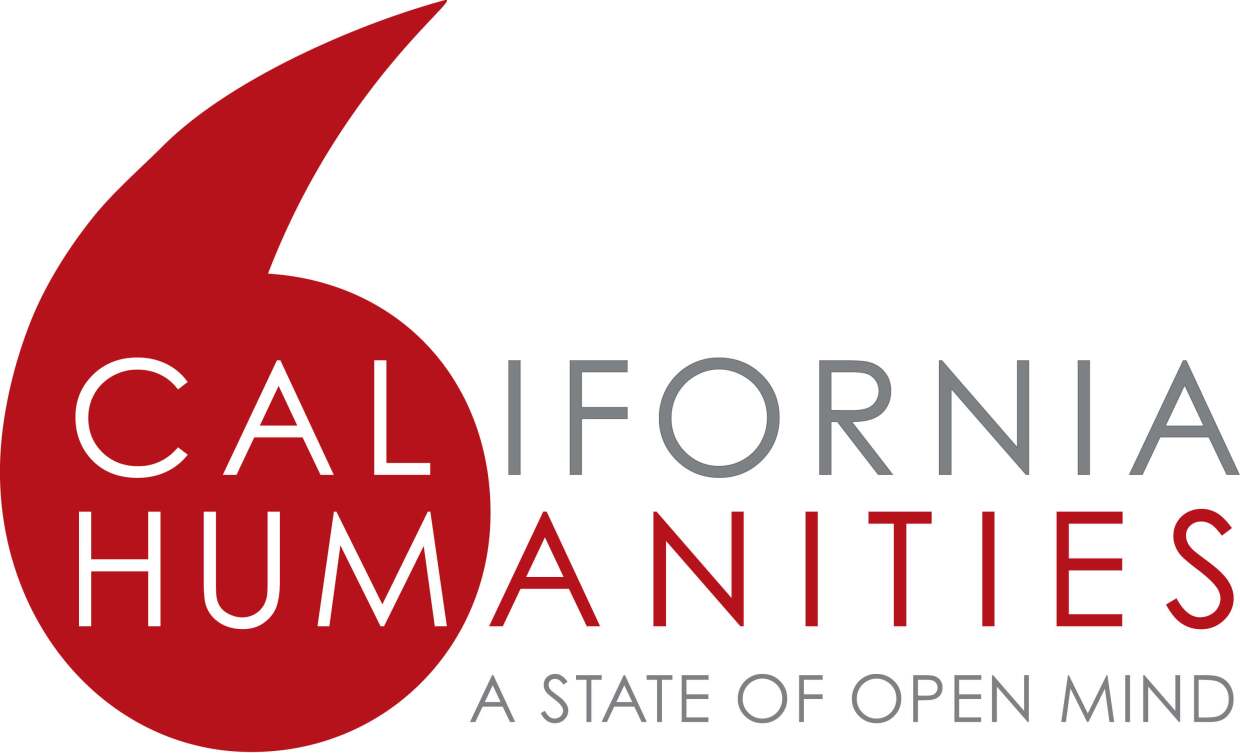
This project was made possible in part with support from California Humanities, a non-profit partner of the National Endowment for the Humanities. Visit calhum.org.







